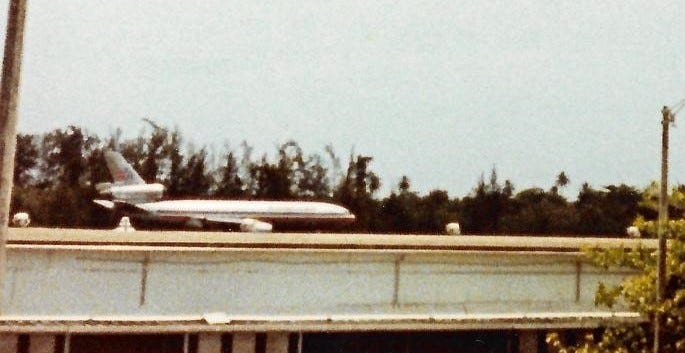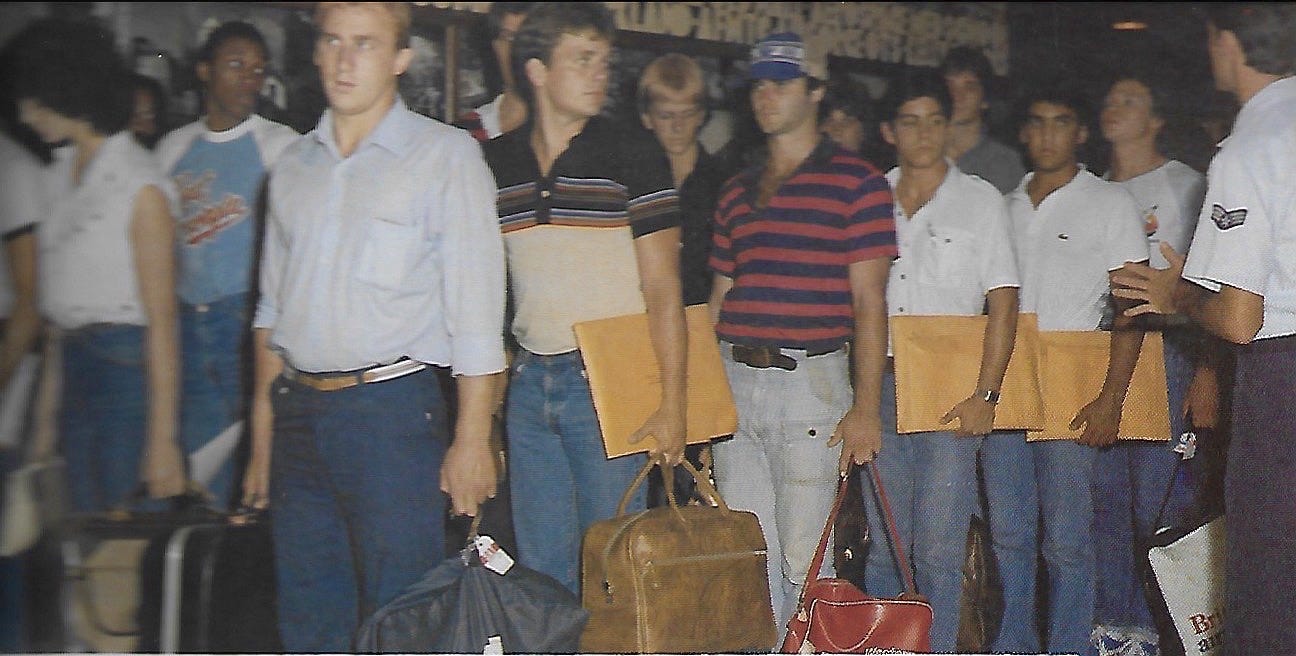USAF Basic Military Training - Part I
In which Teófilo recounts his USAF basic military training experiences.
Mercie and I kept to ourselves during the last few weeks before my departure for basic training. We spent the time dreaming and planning for what we thought would be our December 1985 wedding. On the appointed day she drove me to the San Juan MEPS to swear the oath of enlistment. There the USAF personnel warned us that "the red-carpet treatment has now ended." They put up a stern face and starting barking instructions. Welcome to the military.

Mercie then drove me to the airport. We spent our last minutes together missing us already. The gravity of the moment weighed upon us. She ran out and took pictures of my departing plane as it carried me and our hopes to our future.
A Change in Geography
About four hours later we landed at what was to be my home for the following 13 weeks: San Antonio, Texas. We reported to a "welcome" office at the airport. We met there with transportation personnel and several other arriving recruits. Another set of dog-faced Air Force transportation personnel herded us into an awaiting bus. They then drove us to Lackland Air Force Base (AFB), "the Gateway to the Air Force." The base was and remains the USAF's single Basic Military Training post for enlisted service members in the US.

The terrain looked to me flat when compared to Puerto Rico. Major traffic crisscrossed huge highways going who knows where. Shopping malls, businesses, apartment complexes signified a prosperity I had never seen before.
Entering the Grind
The bus deposited us in front of the intake processing building. That's when the moment became real. Our assigned Military Training Instructors (MTI's) began to tear us down to later build us up into a coherent unit. In fact, there were more than two MTIs shouting and creating mayhem. Somehow they formed us into a marching unit. These the USAF calls flights, which are what the Army calls companies. Basically, four by eight columns of recruits sorted by height. At the leftmost column upfront stood the guy with the guidon, a small blue banner with the flight’s number. We were Flight 136 of the 3704th Basic Military Training Squadron (BMTS). A flamboyant gay man became our guidon-bearer. It was 1985 and we neither asked nor told, much less celebrated his diversity.
But that was yet to be. At that moment we stood sweating in our brightly colored civilian clothes sweating in the berating. At that early stage they called us rainbows, to mock our colorfulness. I doubt they call them that any more.
Week 0
Later, upon getting our buzz haircut and issued our uniform the following day we became “pickles.” On the second week of training, we would get to wear nametags on our olive-green fatigues. At that point we became “canned pickles.” As a result, one could tell which week of training one was by looking at the length of our hair and the nametags in our uniforms - or lack thereof.

The MTI mayhem continued through our march to our dormitory, an open bay holding about 30 single beds. Combination closets and drawer chests lined the outer walls. We had to respond to a TI's query with "Airman So-and-So reporting as ordered, sir." If one forgot to say this simple introduction a TI berating followed.
That's how I got to meet the two MTIs I've never forgotten about. The MTI Leader was Technical Sergeant (TSgt.) James B. Vincent. The service would promote him to Master Sargeant (MSgt.) during our stay at Club Lackland. TSgt Vincent was a paramedic and emergency technician by profession. He'd taken the MTI Special Duty gig out of the goodness of his heart. He hailed from one of the Carolinas and spoke with a marked Southern drawl.
The other MTI was Sergeant (Sgt.) Reinard Sanford. Slim and athletic, he was a Black man from Mississippi and he spoke like it. As a MTI he was both the most severe, and the most kind to me.
The key to survive military basic training is playing the mind game and keeping a low profile. I was able to play the mind game but flying under the radar proved impossible. The clash with their accents often led me to tragicomical situations of horrible misunderstandings. Regional accents had not been a part of my English educational toolkit. I was unprepared to meet them head-on.
Turns of phrase weren't part of my lexicon at that time either. Like the phrase how come. As in how come your safety flashlight isn't working, airman? In my befuddled confusion I also got to learn another set of unfamiliar words I choose not to print here.
My lack of running prowess placed me squarely on their sights. I hyperventilated most of the time and dropped out of formation. I don't know how I passed the Physical Test in the end but I did. So much for "flying under the radar."
(To be continued)
Bonus Videos
Biggest music hits in 1985 Playlist.
Also…




